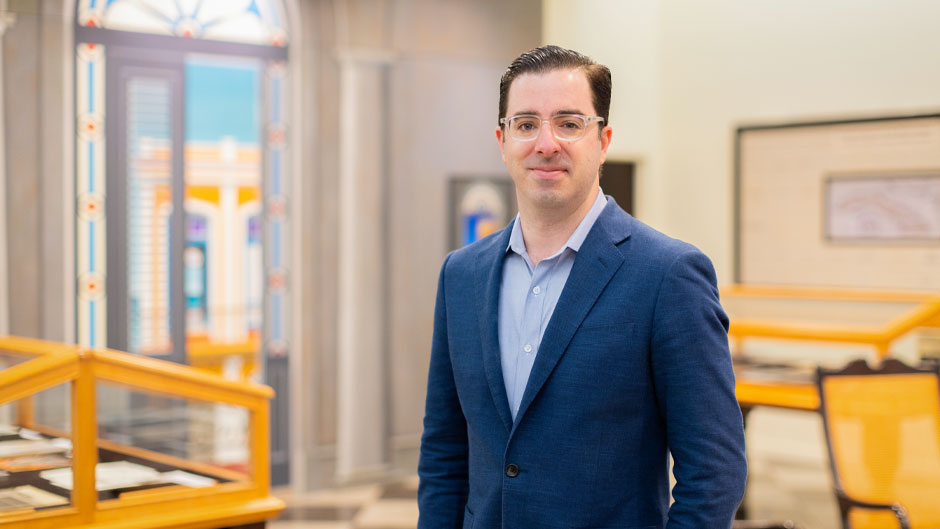After the recent death of his Cuban grandfather, likely from COVID-19, historian Michael J. Bustamante felt both deep regret and pained appreciation that his paternal grandparents rarely talked about the homeland they left, along with their three young children, in 1962.
Bustamante, a specialist in modern Cuba and the Cuban American diaspora, who is joining the University of Miami as the Emilio Bacardí Moreau Chair in Cuban and Cuban-American Studies, said his late grandparents’ look-forward-not-back perspective enabled him to critically explore the diverse historical memories of Cubans on both sides of the Florida Strait, and beyond—a hallmark of his growing research and the theme of his new book.
“Unlike many other Cuban exiles, my grandparents seldom shared their memories of life during or before the revolution,’’ Bustamante recalled. “In a way, I’m grateful because this freed me to think through Cuba’s history—and Cubans’ battles over their history, their memory wars—from an in-between place. At the same time, I also take seriously my responsibility to listen to, and learn from, the stories of those who lived the Cuban past that I did not.”
Bustamante will be coming to the University of Miami from Florida International University on Aug. 15, joining the College of Arts and Sciences’ Department of History as an associate professor. Among his initial goals: to help launch an interdisciplinary undergraduate program in Cuban studies that will complement ongoing studies and research at the University, and, in partnership with the University’s Cuban Heritage Collection (CHC), develop a comprehensive oral history archive of the Cuban diaspora.
“His scholarly activities on Cuban history are important for our broader goals of also developing a premier Cuban studies program,” said Jeffrey Duerk, executive vice president for academic affairs and provost.
Leonidas G. Bachas, dean of the College of Arts and Sciences, said Bustamante’s expertise will be invaluable in building the interdisciplinary Cuban studies program. “During Michael’s earlier research and scholarship, he immersed himself in the Cuban Heritage Collection, which he will now collaborate closely with as our Cuban studies program takes shape,” Bachas said.
Indeed, Bustamante is no stranger to South Florida, nor to the University. His parents, a trauma surgeon and an artist who met through his grandparents—his mother was their neighbor—moved from New Jersey to Palm Beach County when he was 6. He grew up attending Hurricanes’ football games at the Orange Bowl with his best friend’s family. His younger brother, Alex, is an alumnus.
Bustamante is also intimately familiar with the CHC, where he serves on the academic advisory committee and helped conceptualize its “El Efecto Mariel” webinar series in 2020, the 40th anniversary of the Mariel boatlift. But he discovered the archive’s riches much earlier—when the CHC supported his research for his doctoral dissertation with two Goizueta Foundation Graduate Fellowships. Completed in 2016, when he earned his Ph.D. in Latin American and Caribbean history from Yale, his dissertation evolved into his book, “Cuba Memory Wars: Retrospective Politics in Revolution and Exile.”
Growing up in a multicultural home—his New Jersey-born mother is Jewish—Bustamante said his Cuban American identity was forged around his father’s boyhood memories, his grandmother’s cooking, and the artwork of notable Cuban artists that hung in his grandparents’ home.
He credits his grandmother, Isabel, and her job as a cashier at New York’s Waldorf Astoria, with imbuing his early sense of wonder for the broader world. “Anytime foreign currency would fall into the cash register, she would take it and give it to me—a lira from Italy, a pence from England,” Bustamante said. “To this day, I have a little plastic baggie of all these coins.”
From the tidbits Bustamante pieced together, he knows that, amid growing shortages and concerns about the changing content of their children’s education, his grandmother led the charge to leave Cuba. At the time, the couple was living in Havana, where his grandfather, Juan Manuel, had earned his degree in architecture and worked for Havana’s Office of Public Works, while his grandmother worked for a clothing store.
Fortunately, his grandfather still had a multiple-entry visitor’s visa to the U.S. from a work trip in 1958. It expired four days after he left Havana—with his three children, but without his architecture degree. It was seized at the airport before he boarded a commercial flight to Miami. His wife eventually secured her own travel documents, and the two settled in Queens, New York, where Bustamante’s father grew up.
“Now that I’ve lost both my Cuban grandparents, one of my biggest regrets is never sitting down with a tape recorder and insisting, ‘Tell me everything,’ ” Bustamante said. “But now, I have the opportunity to make up for that mistake by sharing my knowledge of Cuba's history—and my appreciation of Cuba and its people—with students at the University of Miami.”

